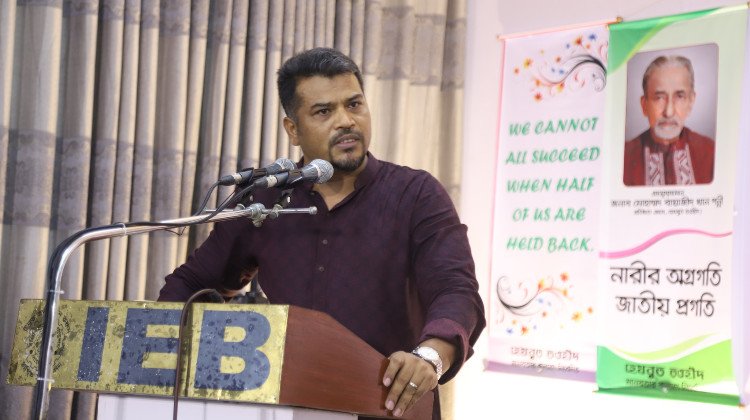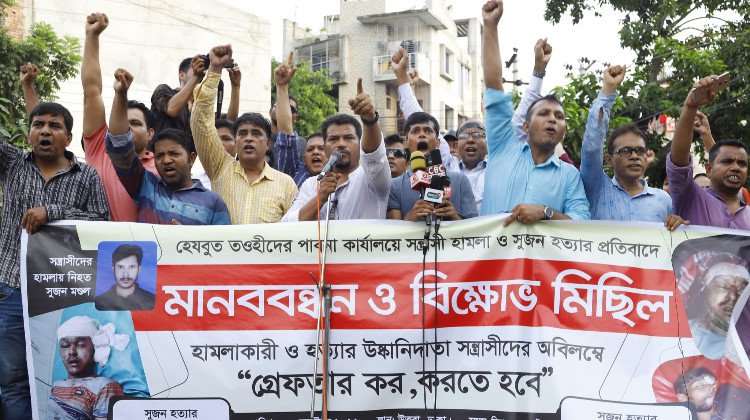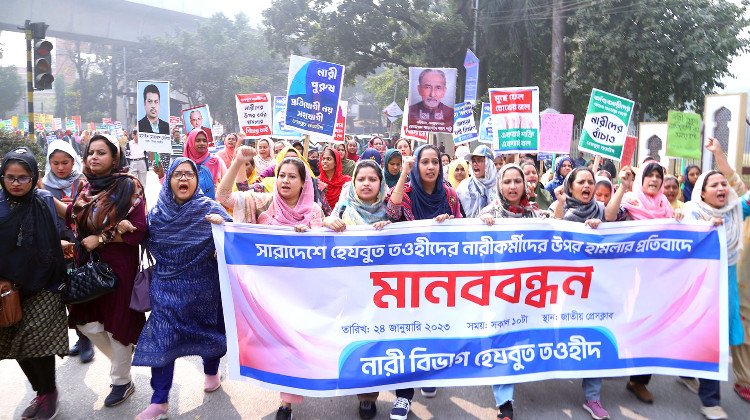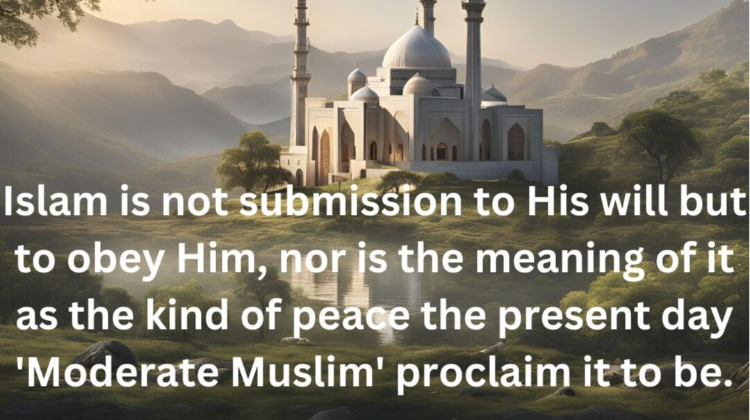Bangladesh’s Security Crisis: Unity and Leadership Needed
Category :
Religious Reflection

Author ::
Salzar Rahman Sabu
Jan 27, 2026
visibility
383 Read
The political and social unrest in Bangladesh, which escalated following the mass uprising on August 5, 2024, has worsened over time. The country is now facing extreme deterioration in law and order, fierce political rivalries, international geopolitical tensions, border crises, and conspiracies from imperialist powers.
Together, these factors have created a complex and multifaceted security challenge for Bangladesh. Beyond that, the country is also grappling with economic crises, social decay, military vulnerabilities, and even questions about its national integrity. Consequently, the future of the nation remains steeped in uncertainty.
To understand Bangladesh’s security crisis, we must first consider a few key aspects:
1. Bangladesh’s Geopolitical Location
Geographically, Bangladesh lies at the heart of South Asia, making it crucial in the Indo-Pacific geopolitical equation. To the east lies Myanmar, to the northwest is India, and to the south the Bay of Bengal—this triangular position significantly enhances Bangladesh’s strategic importance.
Especially with international maritime routes, energy security concerns, and naval trade routes centering around the Bay of Bengal, global powers have become increasingly interested in Bangladesh. Three major powers—India, China, and the United States—have their eyes on Bangladesh.
China, under its “Belt and Road Initiative” (BRI), considers Bangladesh a vital corridor. Meanwhile, the U.S. aims to establish a military base in the Indian Ocean region to counter China and Russia, with the port of Chattogram being eyed as a favorable location.
.
There are also whispers of a possible Christian state in South Asia, with its potential center around the Chittagong Hill Tracts, parts of Myanmar, and northeastern India.
India, on the other hand, seeks to use Bangladesh’s land and waterways to ensure the strategic security of its northeastern states (the Seven Sisters). The competition among these powers for strategic dominance is posing a major security threat to Bangladesh.
Currently, the border region of Rakhine in Myanmar is experiencing insurgency. During Sheikh Hasina’s government, over a million Rohingya refugees entered Bangladesh, and the influx continues. Facing persecution from the Arakan Army, thousands of Rohingya Muslims seek refuge in Bangladesh daily.
Taking advantage of this crisis, the UN—backed by the West—is trying to use Bangladeshi territory as a “humanitarian corridor” into Rakhine.
The interim government is reportedly considering this, sparking intense debate at home and abroad. Experts argue that allowing such a corridor would be a massive security risk for Bangladesh.
If the UN is granted access once, U.S. influence in Bangladesh may expand permanently. Moreover, it could strain Bangladesh-Myanmar relations further.
2. Religious Dynamics and Extremism
Bangladesh is a Muslim-majority nation with deeply religious people. However, due to widespread misinformation about Islam, fanaticism and extremism have flourished. Since independence, religion has often been exploited to commit acts that divide and harm the nation.
Extremist religious groups have weaponized public sentiment, fracturing the Bengali Muslim population into countless sects and factions.
These groups often do not recognize each other, and attacks on each other’s mosques, temples, and shrines are common. Accusations of disbelief (kafir), hypocrisy (munafiq), apostasy (murtad), and atheism are thrown around easily. These groups frequently launch violent protests, torching and looting property.
At religious gatherings (waz mahfils), hate speech against Hindus is common, fueling communal tension and harming Bangladesh’s relationship with India. Some are attempting to use Hindu-Muslim discord as a catalyst for “Ghazwatul Hind,” further deepening the crisis. In India, too, majority-Hindu political parties suppress Muslims to rally their voter base. These dynamics are increasing hostility between the two countries.
In the Middle East, we’ve seen one Muslim-majority nation after another targeted by Western imperialist forces. During the Cold War, Afghanistan was used as a battlefield by the U.S. and USSR, leaving it in ruins. Leaders like Saddam Hussein (Iraq), Bashar al-Assad (Syria), and Muammar Gaddafi (Libya) faced regime changes under the pretext of resisting Western influence.
Other Muslim-majority nations like Iran, Yemen, Lebanon, Egypt, and Palestine remain under sanctions or attack. Over the past 75 years, Palestine has endured relentless warfare without any meaningful help from other Muslim states.
As a Muslim-majority country (with around 90% Muslims), Bangladesh is not immune to these threats. Religious fervor and political Islam are stronger here than in many other Muslim countries.
.
Since independence, multiple efforts have been made to bring Islamic governance into the state structure. This alarms Western powers, as the rise of Islamic systems over democratic ones threatens their global dominance. This is why they systematically dismantle Muslim states, and Bangladesh is no exception.
3. Bangladesh’s Political System
Since Partition, Bangladesh has followed a British-style political model that fosters conflict rather than consensus. This mudslinging, confrontational system has never allowed peace.
Under the guise of democracy, rival parties have engaged in destructive politics—strikes, arson, vandalism, looting, corruption, nepotism, abuse of power—all severely compromising internal security.
After any party gains power, the opposition immediately begins agitating, demanding resignations, destroying public property, blocking roads, and clashing with law enforcement, disrupting everyday life.
Following the recent student uprising, Bangladesh’s internal security has further deteriorated. Ten months after the uprising, political stability remains elusive.
Continued protests, violent clashes between opposing parties, distrust toward the military, extortion, robberies, mob attacks, and police failures have all intensified the crisis. When governments change, their supporters often live in constant fear.
What Needs to Be Done?
When a nation faces severe security risks, it becomes the duty of every citizen to unite and defend the existence of the nation. Just as 75 million Bengalis came together in 1971 to fight for freedom from West Pakistani rule, today 180 million Bengalis must unite to protect the land of Bangladesh.
This responsibility does not fall solely on the military or the government—it is the duty of every citizen. If the nation falls, it is not only the military that will suffer, but every man, woman, and child will face indiscriminate violence.
Just look at Iraq, Syria, Afghanistan, Lebanon, and present-day Palestine—where people are being bombed and shot like birds. No state has come forward to help them.
Even nations we consider allies prioritize their own interests. Whether they will support us in our darkest hour remains uncertain.
So, let us forget all divisions, disputes, and hostilities, and come together to save our nation. Let us unite under one leader, like an unbreakable wall of steel, to protect our people and our country.
This call for unity is being raised by Imam Hossain Mohammad Salim, the supreme leader of the non-political movement Hezbut Tawheed.
For over a decade, he has been warning the nation about the coming crisis and outlining what we must do to overcome it. He has declared: “We will give our lives, but we will not let Bangladesh become another Iraq or Syria.”
Every speech of his urges the Bengali people to stand tall with pride and dignity. Hezbut Tawheed continues its tireless ideological struggle to build a united national identity against terrorism, extremism, religious exploitation, corrupt politics, and imperial aggression.
Alhamdulillah, we, the Bengali nation, are blessed to have such a leader—one who fearlessly speaks against all injustices on the global stage.
No matter what conspiracies are hatched against Bangladesh, if the people unite under one leader, no global superpower will ever be able to defeat us, Insha’Allah.
Images Related to this Post
Search
Popular Post
Recent Post
Tags
Hezbut_Tawheed
Imam Hossain Mohammad Salim
Bangladesh Violence
Religious Extremism
Mob Attacks
Human Rights Violations
Minority Persecution
Rangpur Attacks
Jamaat-E-Islami
Hefazat-E-Islam
Tawheed
Muslim Ummah
Islamic Unity
Shirk
Kufr
Islamic Revival
Kalima-E-Tawheed
Obedience To Allah
Deen-Ul-Haq
Hizb-Ut-Tawheed
Ram Temple
Third Temple
Ayodhya
Jerusalem
Religious Politics
Babri Masjid
Al-Aqsa
Zionism
Hindutva
Netanyahu
Religious Hate
Muslim Unity
Noakhali Conference
Imam Salim
Islamic Movement
Shahidi Jame Mosque
Ht Members Conference
Bangladesh Religious Persecution
Islamic Reform Movement
Extremist Violence
Human Rights Bangladesh
Sonaimuri Noakhali Attack
Political Extremism Bangladesh
Faith-Based Violence
Eid Al‑Fitr
Zakat Al‑Fitr
Ramadan Charity
Islamic Social Justice
Community Harmony
Bangladesh Poverty
Islamic Economy
Sadaqah
Fitrana
Eid Unity
Arab History
Islamic Governance
Caliph Umar
Social Transformation
Women’s Rights In Islam
Justice In Islam
Political Systems
Islam Vs Democracy
Islam And Knowledge
Islamic System
Prophet Muhammad
Farewell Sermon
Hajj
Global Peace
Human Rights In Islam
Dhul-Hijjah
Arafat Sermon
Islam Vs Un Charter
Unemployment In Bangladesh
Education System Failure
Educated Unemployment
Jobless Graduates
British Education Legacy
Youth Crisis
Hezbut Tawheed Views
Bids Report
Ssc To Masters Job Race
Middle Class Dilemma
Kerani Mentality
Excessiveness In Religion
Religious Distortion
Overinterpretation Of Islam
Misguided Enthusiasm
Warnings Of The Prophet
True Islam
Spiritual Clarity
Abandoning The Mission
Chormonai Pir
Desherpotro
Islamic Reform
Persecution In Bangladesh
Religious Violence
Jamaat-E-Islami Attacks
Islamic Truth Movement
Women And Knowledge
Islamic Feminism
Gender Roles
Social Awareness
Muslim Women
Female Empowerment
Islamic History
Qur’anic Guidelines
Obeying Allah’s Commands
Islam And Suffering
Workers' Rights In Islam
Labor Justice
May Day Islam
Islamic Society Model
Chashirhat Development
Imam Hossain Mohammad Selim
Islamic Brotherhood
Fair Wages
Islamic Military Strategy
Tawheed-Based State
National Security
Qur’anic Warfare
Mujahideen
Peacekeeping
Modern Islamic Army
Military Training
Ummah Defense
Sharia Governance
Southasia
Extremism
Bangladesh
India
Pakistan
Myanmar
Jihad
Islamophobia
Radicalism
Resistance
Conflict
War
Terrorism
Proxywar
Bjp
Hasina
Ghazwa
Kashmir
Rohingya
Arsa
Militancy
Ideology
Unity
Awareness
Injustice
Arms
Geopolitics
Gaza
Hypocrisy
Taliban
Alqaeda
Afghanistan
Syria
Iraq
America
China
Russia
Media
Violence
Oppression
Nationalism
Muslim
Islam
Justice
Youth
Leadership
Sovereignty
Hezbuttawheed
Mosque
Governance
Society
Administration
Education
Military
Economy
Women
Culture
Law
Quran
Hadith
Prayer
Madinah
Baytalmal
Amir
Discipline
Khutba
Transparency
Spirituality
Training
Morality
Ummah
Prophet
Sharia
Community
Peace
Development
Security
National
Khutbah
Sabr
Zakat
Sufism
Equality
Mosquesystem
Participation
Aqiqah
Accountability
Tradition
Modernity
Ummati Muhammad
Unity In Islam
Sunnah
Islamic Teachings
Muslim World
Deen Of Islam
Security Crisis
National Unity
Political Unrest
Military Vulnerabilities
Strength
Solidarity
Disunity
Muslim Nations
Women's Rights
Rufaidah Panni
Eid Congregation
Islamic Women Empowerment
Social Justice
Equality In Islam
Momen
Kafir
Mushrik
Allah's Laws
Faith In Islam
Belief In Allah
True Believers
Kalimah
Shariah
Justice And Peace
Political Parties
Multiparty Democracy
Political Factionalism
Islamic Political System
Democracy Vs Islam
Secularism
Political Ideologies
Islamic Law
Political Vision
Governance Without Parties
Political Stability
Islamic State
Shura System
Islamic Perspective
Women’s Reform Commission
Family Law
Inheritance Law
Labor Recognition
Shariah Law
Gender Equality
Religious Opposition
Feminist Movement
Human Rights
Political Debat
Arab Society
Islamic Economic Justice
Military Transformation
Education In Islam
Judicial Independence
Accountability In Islam
Islam And Democracy
Societal Transformation
Governance Systems
Surah Yaseen
Islamic Guidance
Religious Work
Misguidance
Imam Role
Religious Commercialization
Truth And Falsehood
Religion And Society
Quranic Teachings
Ethical Leadership
Spiritual Struggle
Religious Scholars
Religious Corruption
Quranic Verses
Islamic Scholars
Prophet Muhammad (S.a.w)
Military Nation Of Islam
Sahabah
Lost Legacy
Ummah Of Muhammad
Jehad
Qetal
Islam And Violence
Islamic Leadership
State Vs Individual Struggle
Allah's Help
Islamic Reflection
Divine Support
Muslim World Crisis
Quran Teachings
Islamic Awakening
Qurbani
Bangladesh Politics
Eid Ul Adha
Islamic Sacrifice
Bangladesh Crisis
Global Conspiracy
Sacrifice
Labour Rights
Employment Crisis
Bangladesh Economy
Wage Gap
Inflation
Unemployment
Education Reform
Job Creation
Income Inequality
Post-Pandemic Economy
Eid-Ul-Azha 2025
Bangladesh Eid Congregation
Eid Prayer 2025
Women's Participation
Peace & Justice
Bangladesh Religious Events
Eid-Ul-Azha Message
Khilafah
Global Oppression
Islamic Festivals
Quranic Guidance
Spiritual Sacrifice
Ibrahim's Sacrifice
Eid Mubarak
Peace Through Tawheed
Women's Reform Debate
Bangladesh Women's Rights
Hezbut Tawheed Position
Islamic View On Women's Rights
Legal Reforms Bangladesh
Family Law Reform
Inheritance Rights
Sharia Law Bangladesh
Women's Equality
Western Influence
Religious Groups Debate
Gender Equality Islam
Islamic Social Solutions
Women's Dignity In Islam
Islamic Solutions
Beyond Politics
Labor Rights
Class Struggle
Economic Solutions
May Day Analysis
Economic Justice
Divine Accountability
Global Economic Crisis
Capitalism Vs Islam
Socialism Vs Islam
Savar Attack
Ishwardi Attack
Religious Fanaticism
Political Manipulation
Islamic Extremism
Government Response
Democratic Threats
Islamic Teachings Misuse
Radical Ideology
Communal Conflict
Radical Groups In Bangladesh
Terrorism In Bangladesh
Islamic Rights
Mosque Access
Eid Prayer
Muslim Women Empowerment
Prophet Muhammad Teachings
Women In Mosques
Women Rights In Islam
Gender Equality In Islam
Masjid An-Nabawi
Women's Role In Islam
Misconceptions About Women
Women Participation In Mosque
Eid Khutbah 2025
Islamic Sermon
Hossain Mohammad Selim
Bangladesh Eid
Qurbani Meaning
Women In Islam
Rufaydah Panni
Islamic Congregation
Female Participation In Eid
Chashirhat Eid
Palestine Solidarity
Eid Prayer Bangladesh
Women In Eid
Kushtia Rally
Gaza Crisis
Muslim Persecution
Bangladesh News
Peace Movement
Humanity
Divine Law
Social Reform
Religious Harmony
Truth
Call To Action
Palestine
Dajjal
Islamic Struggle
Mohammad Bayazid Khan Panni
Genocide
Oic
Protest
National Press Club
Rangpur Attack
Religious Reform
Karwan Bazar Protest
Terrorist Attack
Law And Order Failure
Emamht
Ht_In_Brief
Pabnaattack
Justiceforvictims
Humanchain
Politicalviolence
Legalreform
Endimpunity
Bangladeshjustice
Hezbuttawheedleaders
Demandjustice
Pabnapressconference
Policeinaction
Proposedgovernancesystem
Islamicstatesystem
Allahslaw
Economicreform
Educationreform
Capitalismcritique
Dhakaevent
Purposeofcreation
Humancreation
Khalifah
Allahsplan
Divineguidance
Adamsstory
Islamicteachings
Peaceandjustice
Sovereigntyofallah
Lailahaillallah
Islamiccreed
Aqidah
Islamicfaith
Iman
Deen
Peaceinislam
Purposeofislam
Beliefsystem
Faithandworship
Why
Escalate
Mohammad Bayazeed Khan Panni
Hossain Mohammad Salim
Religious
Extremist
Interfaith
Situation
Ultimatum
Threats
Extremist Attack
Attack
Movement
Barakat Hossain Osama
United Kingdom
Conservative Party
Donald Trump
Secular Leadership
Fanatical Populace
Fanatical
Populace
Religion
Extensive Damage
Catastrophic Flooding
High School
Urgent Help Needed
Devastated
Allah
Modus Operandi
Messenger
Believer
Messenger Of Allah
People
Human
Jame Mosque
A Cornerstone
Cornerstone
A Just Society
The Establishment
Establishment
History
Messenger Muhammad
Simple And Straightforward
Who Made
The Simple
Complex
Way Of Life
Jannah
Way To Jannah
Civilization
Religious Figures
Survive
Politics
Worship
Establish
Goals And Objectives
System Of Life
Money
Tolerance
Madness
Mo'men
Today’s
Educated
Needs
Corruption
British
Government
Democracy
Communism
Socialism
Political
Secular Education
Responsible
The Reign
Hindu
Terrifying
Slavery
Jewish Conspiracy
The Protocols Of The Elders Of Zion
Politician
Give And Take
Education System
European
Population
Mentality
Slave
Preface
Children
The Quran
The Miracle
Creator
The Creator
Creation Of Man
The Creation Of Man
Premise
First Words
Aqida
The Programme
The Messenger
Mankind
Actual
Concept Of Islam
Crossroads
Mojeza
The Call
Panni
The Author
Qur'an
Process
The Process
A Person
Tabook
The Special Three
Special
The Tabook
The Ahzab
Ahzab
Khandak
The Uhud
Uhud
The Badr
Badr
Ebadat
Ma'bud
Vicegerent
Worshipper
Aqaed
The Reasons
Reasons
Reason
Adam
Eblis
Khalifa
Angels
Adam And Eve
Adam And Hawa












Leave a Comment